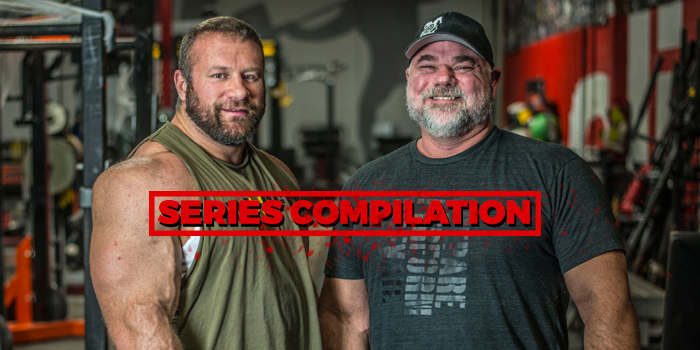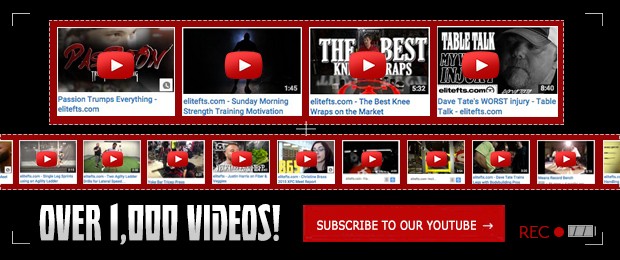
When Justin Harris visited elitefts in London, Ohio in October, he sat down with Dave in the S4 Compound for a special live Q&A. Through the official elitefts Facebook page, Dave and Justin responded to questions from both Facebook and Instagram users. For those of you who missed the live stream or individual video releases, we are now sharing all of the best clips from their conversation. Check out the entire Justin Harris playlist on Youtube, too. Enjoy!
Episode 1
The first topic is pre-workout energy.
Instagram user alter3d_beast asks:
What's the best food for energy pre-workout and are there specific macro and micronutrients drug free lifters need more of?
In the discussion responding to this question, Justin points out that if you really want to derive energy from food, you need to look at an entire day before training, not the 60-minute pre-workout window the day of the session. While it is true that the carbohydrates you eat are stored as glycogen (and hence used for energy), this is a time-consuming process. You cannot simply eat carbohydrates immediately before a workout and expect to have sufficient glycogen. You must think well in advance and consume the proper nutrients ahead of time.
In addition to this, Justin explains that the best source of pre-workout energy isn't food — it's actually a drug, and a legal one at that. Caffeine 30-40 minutes pre-workout is the safest and most reliable source of energy. It doesn't have to be a fancy pre-workout or even coffee; simple caffeine tablets work as well as anything.
Episode 2
In this episode, Dave and Justin discuss the importance of GPP.
Dave, coming from a powerlifting perspective, and Justin, coming from a bodybuiding perspective, offer a unique explanation of GPP and why it matters. Dave begins by first showing that the definition of GPP is entirely dependent upon the sport of the athlete — it means something different for a high school football player than it does for an elite powerlifter. He describes it in one sentence: "GPP is your ability to increase your aerobic capacity to a level that allows your body to recover and replenish nutrients effectively."
Episode 3
For our third Q&A with Dave Tate and Justin Harris, there are two topics:
- Problems lifters encounter trying to get carryover from a box squat to a free squat.
- Working with a nutrition coach.
Dave takes on the first question and names the biggest issue he sees between the box squat and the free squat: most lifters don't perform them the same way. Continuing the topic of coaching yourself, Justin discusses how to work best with a nutrition coach. He shares the way that he structures nutrition planning for his clients, and explains that making legitimate changes in your body over a long period of time requires the ability to make adjustments on your own.
Episode 4
The biggest fear of any bodybuilder—or any strength athlete at all, for that matter—is muscle loss while dieting. While trying to get lean, a lifter's worst nightmare is losing muscle, undoing the months and years of hard work that went into building it. This is why lifters put so much focus on nutrition and supplementation during fat-loss phases.
In this episode,
Justin Harris says this concern is overblown; if you're eating and supplementing correctly, you don't have to worry much about losing muscle. It's when you screw up your eating or your training that you need to worry. In this video, Justin and Dave talk about timing of cardio and how to perform it to achieve the best results without muscle loss.
Episode 5
How old are you? This is a fairly common question to ask when designing a training program. Even on elitefts.com you can find articles about what it means to be old and how to make adjustments to keep progressing as you age. It's true — age matters. But Dave says there's another age-related question that matters almost as much: what is your training age?
In this video, Justin and Dave discuss the differences between true age and training age in response to a question by Instagram user f15warbird:
"I'm a 48-year-old who started lifting two years ago, stopped fucking around with bro split programs one year ago, and started actual training. I am now training for my first powerlifting meet. What advice do you have for someone like me beginning competition at an age where most people are retiring?"
Episode 6
In this video, Justin Harris and Dave Tate respond to a question from Instagram user usedtire:
"For dieting, how does Justin feel about low carb, high fat, protein vs. low fat, high carb, protein? Outside of protein powder, what other supplements does he recommend?"
Justin opens his response by referring to thermodynamic principle known as the Law of Conservation of Energy. You cannot violate this law — if you could, proving so would earn you an immediate Nobel Prize. What this law means for someone dieting is that if you burn more calories than you consume, you will lose weight. Every other factor falls in line behind this.
Episode 7
The final topic is short and simple: do most people overcomplicate training?
To answer this question, Justin Harris uses a money-making analogy: if you take a day off work to walk around picking up pennies, you're never going to become rich, even if you go home at the end of the day with more money than you started with. The same holds true in training and nutrition; if you don't put in effort in the gym and eat full meals consistently, the most perfectly-designed training program and supplement plan won't take you to the top.
What really matters for progress is short and simple: work hard in the gym, stay committed to eating good meals, and sleep enough to recover. Without these three things in place, nothing else you do matters.
Win Free Elitefts UGSS with Special Guest Mark Dugdale, Jan 14th, 2017











I would love to see you guys do a video on your take of different training splits (e.g body part splts vs whole body/movement based days) in regards to muscle hypertrophy and strength and what protocols you feel work best.